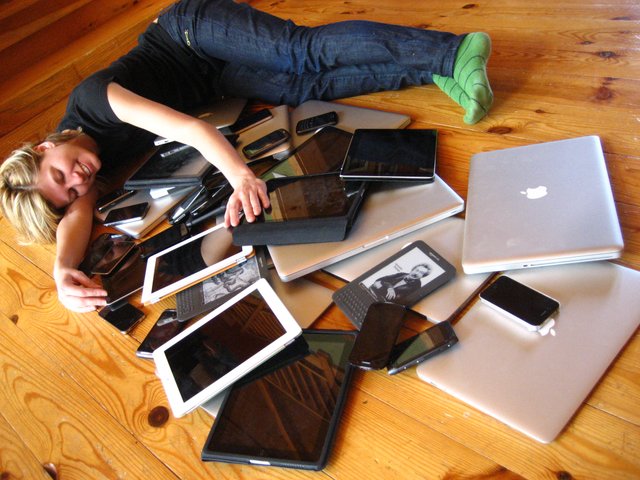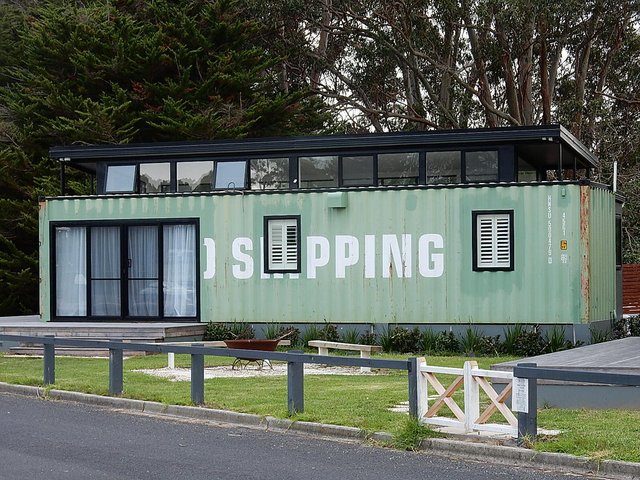Future survival skills: are you techno - literate ?

If you follow my blog, you might have noticed that I am worried about fast becoming obsolete if I don't adapt myself to the idea economy. You too can become obsolete if you are not careful...
With the benefits of exponential technological progress also comes a flip side: everything is becoming more and more complex and to be able to participate in this new economy, you will have to develop some new skills.
In the past 70 years, not knowing the alphabet would exclude you from most of the modern knowledge economy.
In the near future, just being literate and knowledgeable is not enough!
You need to develop techno-literacy to participate in the idea economy.
As often happens, Kevin Kelly has thought deeply about this and has written about this in a post here
http://kk.org/thetechnium/techno-life-ski/
I will use this post as a skeleton to add my comments and see where that gets us:
He describes it as follows:
I like to think of this ability to deal with any type of new technology as techno-literacy. To be at ease with the flux of technology in modern-day life you’ll need to speak the language of the technium, and to master the the following principles:
1) Anything you buy, you must maintain. Each tool you use requires time to learn how to use, to install, to upgrade, or to fix. A purchase is just the beginning. You can expect to devote as much energy/money/time in maintaining a technology as you did in acquiring it.
As I wrote in my article about leverage in life tools can provide you with great leverage, but they come at a cost.
Unless you use your tools intensely to obtain their multiplier effects, you are not getting a return on investment out of your tools. What you are left with is pure cost, that can be monetary, (check your Visa statement for recurring costs) or even worse an attention cost (how much time are you spending on that iphone looking at Facebook?).
I think a huge trick is going to be to clean up the various gadgets, internet services, subscriptions etc. in your life to the strict minimum and then use the next principle:
2) Technologies improve so fast you should postpone getting anything until 5 minutes before you need it. Get comfortable with the fact that anything you buy is already obsolete. Therefore acquire at the last possible moment.

I am in the process of selling everything (Read here why) and am facepalming myself several times a day when I start to realize how much money I have locked up in all kinds of gadgets etc. that I stopped using. It adds up.
Moreover depreciation of this stuff is scary.
Lately I just stopped buying new stuff.
I find that there are secondhand stores which sell me the next to last generation for 30-40% off and accept my old gadgets in trade for a decent return (which of course I also bought second hand).
Playing this game I can keep up to date for a fraction of the price of buying "new".
The dirty secret of the whole consumer electronics business is that the curve of improvement has flattened on most devices. Going from a Nokia "dumb" phone to the first Iphone was an exponential step.
Going from say an Iphone 6 to 7 is an incremental step, no matter what they try to tell you...
If you were already not using the full capabilities of the Iphone 6 (and most people don't even come close)
Why bother upgrading? In one word FUD
Of course another reason is planned obsolescence, so you can't keep your gadgets too long or they stop working, so finding the ideal point where you get maximum utility for minimum price allows you to enjoy technology without becoming a slave to it. (...literally, noticed how much of your income is paying for technology in your life, have credit card debt?)
3) You will be newbie forever. Get good at the beginner mode, learning new programs, asking dumb questions, making stupid mistakes, soliciting help, and helping others with what you learn (the best way to learn yourself).

I think there are different strategies here:
a) If you are going to use the new tech constantly: "Keep at the cutting edge and learn constantly new stuff."
b) If you use it occasionally but can't invest the time to learn: Outsource to freelancers who are at expert level and charge you by the hour. One hour of theirs as an expert is probably as effective of 10-20 of yours as a newbie. This way you still get a multiplier effect of the technology without having to invest time and effort to learn it.
c) For non-critical stuff in your life: Refuse to upgrade until the last possible moment, if it is still working for you.
Say you take occasional pictures, your 2 year old pro-level camera can still produce great pictures, unless you are a professional who makes an income from this technology, it stops making sense to keep upgrading your tech and knowledge. Good enough is good enough...
I think a blend of these strategies is going to be needed. You can't possibly keep up with every new development. Neither should you probably.
Like I said in the leverage article, if you are able to use tools for the multiplier effect you can probably justify the investment of time and effort. But keeping up with everything can't possibly give you a return on investment. Being selective about what you start as a newbie is probably a skill that goes with this one. See point 19 of this article
(yes point 19 I just realized this is going to be looong again... but it should be life altering so there's that)
4) Often learning a new tool requires unlearning the old one. The habits of using a landline phone don’t work in email or cell phone. The habits of email don’t work in twitter. The habits of twitter won’t work in what is next.
A difficult one, my brain rebels against it... "Why change AGAIN!" it screams.
In crisis lies opportunity. Because the rules keep changing this also creates constant opportunities for level playing fields.
Notice how things here on Steemit.com seem to work differently? Well that is your chance to be an early adopter and learn before the masses that will wipe you out with their Twitter prowess or Youtube fantaboulessness . So it cuts both ways...
5) Take sabbaticals. Once a week let go of your tools. Once a year leave it behind. Once in your life step back completely. You’ll return with renewed enthusiasm and perspective.

I think this can't be underestimated. Technology is great, but it is no substitute for thinking. Deep thinking is difficult with all the distraction that technology creates. In the end your ultimate tool is your brain, and that needs maintenance too. An occasional reset allowing it to regroup and focus again is a huge factor in creativity and original thinking.
Your brain can't be in constant reception mode, it will create information overload. By not having access to your tools, you will need to work around problems. That can in turn help you to re-evaluate your existing tools, find new ways to simplify your toolset or find whole new purposes for your tools.
6) How easy to switch? You will leave the tool you are using today at some time in the near future. How easy will it be to leave? If leaving forces you to leave all your data behind, or to learn a new way of typing, or to surrender four other technologies you were still using, then maybe this is not the best one to start.
Here I slightly disagree: yes the cost of switching can be high, to the point where it does not give you any return on investment. BUT
Starting with a clean slate can be great. A breath of fresh air. A radical choice to give up everything to jump to a new technology can be exciting but there is a cost too.
The problem with newer technology is that their useful life-cycle is ever shortening (for social media look at myspace, Geocities, ... look at obsolete social media sites alone
Overcommitting to one technology is in my opinion the riskier strategy. Of course, switching needs to make sense, switching too soon or too much can totally obliterate any benefits. The art will be in adapting to change
7) Quality is not always related to price. Sometimes expensive gear is better, sometimes the least expensive is best for you. Evaluating specs and reviews should be the norm.
%20(Custom).jpg)
I am slightly addicted to looking at specs etc. On thing you realize quickly is that quality and utility are very contextual to your needs. I have a Leica IIIc which is about 80 years old. Still works fine. Quality! But I don't take pictures with it... Instead I use my cellphone which I always have with me.
On the other hand, lightweight backpacking learns you some important lessons of quality vs price.
A guy who has this down to a fine art is Tynan http://tynan.com/quality
Price and quality are not always related either:
There are interesting arbitrage opportunities when items of high quality are perceived to be outdated but are still perfectly functional. Because they are of a high build quality they tend to last way longer than their perceived badge value.
I am looking at second hand cars for a 6 month road trip.
What am I looking at? 12+ year old Toyota sedans. Why? Fully depreciated and technically super reliable. I drove a Camry in South Africa that was 22 years old and had 400.000 + km on it. You learn from aviation that with mechanical things age is relative, good maintenance keeps things going a looongg time.
These are cars that might not make sense for a daily commuter, but my spec's are different: I will do relatively low annual mileage in a few large trips.
By optimizing for these specs I can get maximum utility for minimum financial expenditure. The Mercedes in this picture, you could buy a few years ago for peanuts, and this car with good maintenance will outlast the latest model of this year. There are quite a few million KM of these kind of cars.
8) For every expert opinion you find online seek an equal but opposite expert opinion somewhere else. Your decisions must be made with the full set of opinions.
You can go nuts trying to get advice from the internet. Opinions abound.
This is why curation is so important. It is much more than just clicking a few upvotes. Good curators share your criteria for good content and criteria, you can outsource your decision making to an extent if you understand what these curators are optimizing for.
The tricky thing with opinion is that it is rooted in local rationality. Everyone has theirs.
People do and say what makes sense to them based on their understanding, personal goals and focus of attention.
Before you can understand if opinions from other people are useful, you need to understand their local rationality: what is their understanding? What are their goals? What is their focus?
Taking advice from a New York fashion icon when you are in the wilderness of Alaska is not going to do you much good...
Same with investment advice, you need to understand these people's risk profile, goals and how well they understand what they are "advising " about.
9) Understanding how a technology works is not necessary to use it well. We don’t understand how biology works, but we still use wood well.

Reminder to self: Need to keep this in mind with crypto... you don't need to be a car mechanic to drive a car...
Investing time and effort to understand something can be helpful.but you need to understand the utility...
Going into technical rabbit holes can be fun definitely, but where is the return on investment of your time?
10) Tools are metaphors that shape how you think. What embedded assumptions does the new tool make? Does it assume right-handedness, or literacy, or a password, or a place to throw it away? Where the defaults are set can reflect a tool’s bias.
A point to ponder: how will Steemit.com's transparency, incentives and permanency change the way you think and communicate? Are you still authentic?
Or is it actually improving your way of thinking because of the incentivization of positive constructive comments and posts?
11) What do you give up? This one has taken me a long time to learn. The only way to take up a new technology is to reduce an old one in my life already. Twitter must come at the expense of something else I was doing — even if it just daydreaming.
A point I make obliquely in my article on leverage
Tools that provide you leverage always have a cost, sometimes not expressed in money but even more costly attention and focus. Yes you get lots of information with the new social media tools, but is it costing you your ability to think deeply and create valuable ideas yourself?
12) Every new technology will bite back. The more powerful its gifts, the more powerfully it can be abused. Look for its costs.
FAcoughCEcoughBOOK... 'nough said..
13) The risks of a new technology must be compared to the risks of the old technology, or no technology. The risks of a new dental MRI must be compared to the risks of an x-ray, and the risks of dental x-rays must be compared to the risks of no x-ray and cavities.
.jpg)
Technology and technological progress is always a double edged sword.
Yes a chainsaw can cut down trees faster but it is equally easy to take off your own limbs. A stone axe will maybe give you a bruise or cut at best while using it.
The more powerful any technology is, the more its potential negative effects.
My field is Safety Management, and the intersection of humans and technology is a source of endless possibilities for things to go very wrong. Most of the time they go right and we reap huge benefits.
But think about the downside of what you are exposed to when it all goes pear shaped?
4 main questions of risk management for your protection:
1 What is potentially going to cause your next loss? (Are you willing to suffer that loss?)
2 How do you know that?
3 What are you doing about it?
4 How do you know (what you are doing) will work to keep the loss from happening?
14) Be suspicious of any technology that requires walls to prevent access. If you can fix it, modify it or hack it yourself, that is a good sign.
.jpg)
Not sure if this is still going to be applicable... with increased technology comes increased complexity.
For instance Linux is great because it is open source, but I am not a programmer and not in danger of becoming one so I have to trust the community that is working on it that they will do it right.
Same with Steemit.com by the way.
15) The proper response to a stupid technology is to make a better one yourself, just as the proper response to a stupid idea is not to outlaw it but to replace it with a better idea.
As anything in life, natural selection is at play. If you are forced to use stupid technology, your organisation might very soon become disrupted by another organisation or community which is using better technology. Not a matter of IF just WHEN it will happen...
16) Nobody has any idea of what a new invention will really be good for. To evaluate don’t think, try.

This captures something I feel is very true about Steemit.com and STEEM.
I have a hunch it will be MUCH more than yet another blogging platform.
It has the potential to become an entire marketplace, that allows to bootstrap its own development generate important research and create major societal change.
The ease of access to talent, frictionless paying that talent for fractional work
and trustworthiness through the transparent and permanent nature of the blockchain can all combine to liberate enormous human potential.
If you watch Jerry Banfield and others, there are initiatives to bootstrap new applications for the Steem blockchain.
The exciting thing is that capital investment within STEEM is not limited anymore by how you can convince outside investors.
The users ARE investors which removes a lot of friction in the R&D cycle.
This could make the development of the whole STEEM ecology itself exponential.
17) The second order effects of technology usually only arrive when everyone has one, or it is present everywhere.
Continuing from 16. It will be very interesting to see if say 1 % of the world population will be using Steemit.
That can happen in about 3 years by the way, look at the math here
18) The older the technology, the more likely it will continue to be useful.
This sounds paradoxical but it is very interesting. Not all tools that are old are going to be replaced by high tech.
The idea is explained here http://kk.org/thetechnium/technologies-do/
19) Find the minimum amount of technology that will maximize your options.
I think this is a critical skill. To realize the maximum impact in life, an 80/20 rule will apply with technology.
Becoming like the Jetsons is probably not what the future is going to be like.
They say "Technology is a fantastic slave but a terrible master"
More and more we have to be selective about technology, which requires thinking critically about it and recognizing hidden cost.
Technology can make life great, my ambition is to make a living someday by writing on Steemit.com while travelling the world sitting on terraces sipping exotic drinks... Who knows that might happen...
But once it would start demanding my attention 24/7/365 it would be a terrible life...
The more useful metrics we should apply to technology are :
Is this making me free, is it creating more options in my life?
Is it saving time or eating time?
Is it making me money or obligating me to more and more overtime to be able to afford it?
Does it give me energy or is it sucking energy and depressing me by using it?
Does it allow me to create or is it just something that makes me consume?
.jpg)
This post earned me almost 18.00 SB so that will be split between 2 commenters: I am so glad that prizes are getting bigger! This post did very well, and I hope I hit a few 100 SBD + posts, that I will gladly share COMPLETELY with my awesome commenters!
This was difficult to choose, there were so many commenters which had valuable and thoughtful contributions!
In the end the winners are:
@texcentric for the Re-steem and the good reason why!
@fredrikaa for the most thought provoking comment and an awesome reminder to check out Alvin Toffler again!
They get 9 SBD each.
This is part of my JULY EXPERIMENT where I share ALL my SBD's earned with one commenter and one resteemer.
What do you think so far? Should I split up bigger SBD amounts? Or should I keep it to 2 so there is a chance of a really BIG pay off?
I'd love to be able to give 100 SBD prizes, for an article which did well for me would be awesome!
For all my other commenters:
@voice-of-reason , @dali.soh , @janreyqm1 , @centaurmystic , @por500bolos , @texcentric , @wealthy-easily , @zukaza , @sighmanjestah , @foodie.warrior , @macstrong , @snakiest
I tremendously enjoyed your contributions and support, I am sorry I can't reward all of you guys (yet) but I would encourage you to keep commenting on my other posts, earnings are starting to get decent and I hope to be able to keep ever larger prizes! If you find the article worthy of course, I hope you consider re-steeming it to grow the pot for everyone and get more people involved in these discussions! I learn so much from it!
EVERY POST I MAKE IN JULY WILL SHARE THE SBD's It PAYED OUT, even if that means I make 1000 SBD, I'll GLADLY share that with people who make constructive comments.
I explain why here
Wow I did not expect that at all. Thanks a lot @the-traveller ! I hope we can have more thought provoking and engaging conversations in the future, and that we thus can contribute to making steemit an even more awesome and useful platform :)
Again thank you!
no problem! Comments like yours are what makes this platform valuable to me! I firmly believe that to build a valuable platform here on steemit, commenters are essential! So I happily share the bounty :)
This was a very good article. I would like to add one thing to the old vs new tech. There are reasons to buy tech that falls across the new to old spectrum. Here's a few examples of items that I buy at different positions on that spectrum. Cutting edge new tech, I in contract to the author tend to buy new PCs,tablets, and phones and here's why: If it is new, the parts supply will last longer and as long as I have parts, I can keep the device going. I don't even consider replacing a device until it is totally beyond my ability to fix or it is over 5 years old. Also, I tend to buy higher performing hardware because even if you can keep the hardware going, if it is being choked by the blotware you still have to replace it. Finally, I avoid in order Apple, Windows, and Android in favour of Linux. All the afore mentioned manufactures push updates to the devices that over time ensure the blotware problem. I suspect it might just be on purpose but have no evidence. Old devices hit the blotware wall sooner than new. However, even though I just recommended new tech for computing devices, don't buy too soon. Let others be the Guinea pigs and find out which phone's battery will catch fire or which PC's capacitors fail within a year.
Hard drives is something that I buy in the middle. Since the purpose of a hard drive is to store data, I want to maximize the storage per dollar of my purchase. So for all the drives I look at I calculate the terabytes/dollar statistic and choose the highest one. What you will find if you do this is that when a new device comes out it is scarce because it is just starting to be manufactured and it has a certain 'shiny new' which drives its price up. At the end of the products life span, it is again scarce because it is out of production. However, right in the middle is a sweet spot where it is being produced in large numbers and it is not the shiny new thing where the capacity per cost is maximized. This is where I like to buy some things.
I can't really think of an example of old items I like to buy. In general, sometimes its good to wait and see what tech is going to be around for a while before you buy in. Think VHS-Beta or Zip Drives-Flash Drives.
Finally, I did resteem this because this whole article is something I could have written with very little exception. There is a lot of good advice that only comes from experience here and it is nice to see it codified in one spot.
This one of the best post I've read so far on Steemit. Absolutely capture some of my thoughts that have been going on in my head lately.
Everything that was invented yesterday is already outdated and the pace of technological advancement is so rapid that we cannot afford to stop learning. The opportunity cost is just simply too great.
You mention that the cost of depreciation is a financial drain. I would like to urge you to take advantage of the other side of depreciation. Everything that is a liability can be changed into an asset if you use them correctly.
If you are an employee, then owning a luxury car simply doesn't make sense because a huge portion of your salary will be spent on something that doesn't generate you a return. However, if you own a vis-vis a company and declare it as an expense, then you are essentially having an asset because you pay less taxes. If you love technological gadget and you not willing to give them up, all you have to do is to simply find a way around the existing system.
Once again, 2 thumbs up for the beautiful piece. Resteemed and upvoted!
Oh
Thanks for the compliment ! That does mean a lot to me!
Totally agree with taking advantage of depreciation, the last few years I do that constantly!
I love Mr Money Moustache's advice (discovered him through Tim Ferriss's podcast
"Why spend more on a car than you would for investing in your future?" you find it at in the recording [24:33]
Nice article
It is interesting (and a bit scary) how I who just recently graduated with a degree in economics, still feel that my education is outdated. Why? Because we only used analog tools!
Sure I can do a lot of statistical and data analysis. Give me a dataset and I'll plug it into SPSS or STATA and produce any advanced analysis you'll ask for. However, we didn't learn to write a single line of code! So while all the companies our education system were aiming to steer us into are still looking for our analog expertise, it is these companies that faces challenges to become digital. To move from analog tools that provide a one time analysis of data, to digital tools like R and Python, that can import similar datasets over, and over, and over again. And not only produce the same task indefinately, but also improve the quality of the results with Machine Learning.
Luckily, there are plenty of high quality online courses freely available for anyone with the determination to learn. So I have set myself the goal of taking the step from an economist / data analyst to becoming an economist / data scientist over the next ~2 years. The good news is that everyone, everywhere, are exposed to the same phenomenon, so it's all up for grabs for those who want to learn to take the high seat!
good thinking. Have a look at "The inevitable" by Kevin Kelly: I believe in it he makes the case that the people who will make out best in the future are those who are able to team up with technology... so your strategy seems sound !
great quote by the way need to read me some more Alvin
I love the quote. Have had it attached to the corkboard over the desk where I used to study as a student, and now continue on taking some courses still. Gives good motivation!
Check out google nano degrees by the way: They seem to be right up your alley for data and machine learning. Finish that and you are pretty much 100% guaranteed to have a no doubt lucrative job.
https://www.udacity.com/nanodegree
Excellent article as usual.
For myself, technology is good as long as it is useful to me. Any vehicle I buy I buy a workshop manual for and go looking under the bonnet. Totally agree about the old cars. Here in Portugal cars are way over priced, even the older ones, but I was shocked when I started looking to buy an old one just how well they keep here. rarely will you see rust underneath. I assume, even by the sea with the salt air, the climate is good for cars.
This old laptop will last until it explodes. It has no battery and no hard drive. I run a full Ubuntu linux system on a 64gb SD card. It's a little slow, but still does what I need it to do. Linux of course was the main improvement. not too hard to learn but is more secure and much faster than windows could ever be. Linux has come a long way and is much more user friendly even for the novice.
My one rule of any technology is "Do I control it, or does it control me?"
I cannot be ruled by a piece of equipment nor have my life dictated by the needs of a computer. It works on my timescale or it goes.
Yes indeed, we all jump in somewhere we can afford on the technology chain, but as you said above, research, research, research and buy what you need not what looks pretty on the ads.
Hey Centaur !
l have been wondering about Linux : l have an old Thinkpad laptop which is built like a tank. It has been sittingn a drawer for a while, since it had a problem charging : I'd like to get it fixed and give Ubuntu a go to see if it works as a writing / browsing tool. As hardware it's great, built like a tank and has touchscreen and stylus input. Would be a shame to junk it...
For that I would recommend Lubuntu. A light version of Ubuntu. I have put that on a little old laptop of ours too. Libre office is a free office suite like the microsoft one and of course browsers such as chrome and firefox all work fine.
Cheers for that will give it a go. Regarding overpriced, we just came back from the junkyard, excuse me second hand car lot and indeed prices here in Spain are much higher than for similar cars in Belgium. Say a 2003 Mondeo 200k Km goes here for 3000€ in Belgium you get them @ 2004 vintage with 150k km for 1500€ !
And for that 3000€ they are all in terrible shape.
So I guess we will be buying a car in Belgium or Germany, much more paperwork, but to get more car for way less money it probably is worth it. Actually looking at it closely, you can double your money buying in Germany driving around for a year and selling here in Spain hehe. Free transport + bonus pocket money.
3000 € German 2007 Ford Mondeo is worth at least 6000 € here in Spain.
Geo Arbitrage, gotta love it! Need to write a post on that.
Agree about buying in Germany. Had a few cars there. Paperwork all seemed simple enough and you know if the car is tested it's done properly.
Problem here in Portugal is the matriculation of foreign plates to Portuguese. Can cost more than the car is worth and the Portuguese police go looking for foreign plates that have been here longer than six months.
Very thought provoking post! I agree with some points and beg to differ with some. At the moment, I mostly lean towards supporting technology. In some ways, it has changed my life. I fear I cannot live without being surrounded by it anymore. :)
Oh please do differ... I love those comments!
I wrote another article about leverage where I explain how multiplier effects are a total game changer. What you can't take for granted is that just owning technology is going to produce that multiplier effect automatically.
Technology also has hidden costs that can totally obliterate any gains. Financially, psychologically and time wise (which is the ultimate resource in life). In Kevin Kelly's rules you will detect a healthy amount of suspicion too which I think is the right mindset.
Thank you! Sounds intriguing. :) I'll definitely check it out.
I'm gonna play your game here as a Re-steemer.
¿Why? because besides of possibly have the will to try become techno-literates ourselves, better we all keep going remaining like simple half-assed Actual Literates with the mere ability and True Desire to learn something new just by caring reading top to bottom long elongated posts like yours. :)
¡Resteemed!
Hehe you always make me read your comments twice...in a good way! Much appreciated for the re-steem!
Yeah mate, I can imagine. Besides my poor & weird english, I know extravagant minds wording may sound way too often a little bit cryptic when connecting brain with fingers typing in not native tongues. :)
strange, so far you are the only one to bother to play the resteem game...
Steemians must not be motivated by money after all...
Well, certainly there are lotta different motivations in human behaviors. But gain, share & spread additional knowledge, clearly is not the most outstanding in this era of instant self proclaimed experts. ;)
I had already decided to resteem this article before reading the part about your reward to the best reason for doing so. The reason being very simple as I try to hold to the K.I.S.S. (keep it simple stupid) principle. You've stated a lot of pragmatic and common sense ideas that I am already practising. It is nice to read a validation of some things that I am already doing, as it tends to make one feel that he is on the right track. When I see good advice I like to pass it around because a productive community that breeds generosity through sharing will thrive, as long as it weeds out the hoarders (cough cough self-upvoting comments cough cough).
Thanks texcentric, I really appreciate it. I am running this as an experiment. Trying to find a balance I reward the resteems so the pot can grow bigger for everyone.
But on the other hand I don't like lotteries either because blindly re steeming is something that is not useful.
I would not like it if people who have no affinity with the content just plaster it all over just for a chance to earn a buck.
That is why I ask to explain with a good reason why you are re-steeming. People who support the ideas enough to share them are persons I will gladly follow in turn to see if they have found similar content and ideas in their own posts.
That was..a post that could develop into a 3-day seminar @the-traveller..
I feel that the vast majority of techno-consumers tend to be passive rather than aware techno-literate ones. The desire to continuously upgrade their gadgets to the latest ones, even at only a mini incremental upgrade, is fuelled by their inability to treat gadgets as mere tools like one would treat a drill or a hammer (now if you told me to pay double the price for a new hammer with a leather grip upgrade or a stronger wood handle, I would not really be so convinced to buy, yeah?).
This mentality of greed is likely more pronounced in Asia and in larger cities because the mindset of youngsters that possessing the latest editions of gadgets is cool. I've noticed that so many people react in an overly-approving way - whether faked out of politeness or genuinely - when they see a new gadget and hear that it is the latest version, even if they have zero knowledge at all about that particular model. This fuels a trend of people wanting to either give or receive the latest version of GoPro camera, iPhone, etc. etc. for birthdays or special occasions. I don't belong in this category, because I've been on the receiving end and realised that some of these gadgets, I don't even use regularly even after the initial hype I felt when I first got it.. I would really rather have a cool experiential gift or even cash over those.
But it's not only about me. I wouldn't put this down to peer pressure per say, I would put it down to the norm that everyone accepts, and then internalises and starts to practice as a default mode..
Come to think of it, a lot of people are in default mode, that is why there is not as many active proponents of the idea economy yet.. People simply haven't recognised the gravity of being left behind and choose to remain complacent in the face of all the change and talk of change going around them..Or maybe they don't even know where to get started.
Anyway, I belong to the group that is passive about my technology, so maybe I'm being kinda two-faced..but as I said, I treat tech as a tool of convenience..that's why I also take photos with my phone really, because the pictures quality is still decent and it's a lot more convenient..I'm a big technological noob really, and that has to change sometime, but I'm still swimming around in complacency regarding this because I can rely on my husband for help always :)
Note: my observations are generalisations from only my small view...I accept that they are not very representative, and I don't think it includes the people here on steemit so much..from the feel of it during my short time here, the community is made up of rather intellectual, forward-thinking, nerdy (i mean this in a good way! :p) individuals..I think at least 50% are big on reading specs too ;)
Sorry if my comment is super rambly and disjointed..brain is a bit fuzzy right now..not feeling so well. Anyway, great article..is this kind of content what you would like to put on Udemy? :)
you guessed my evil plans for world domination... Eventually I do think I will turn this material in online courses. Material such as Kevin Kelly's is like a manual for the future. We are given all this stuff without good guidelines on how to use it. It's like an open bar for teenagers...
A lot of people are unconsciously abusing it and believe me, as a coach I see some people who are having serious career issues. Their abuse of social media is eating up the time they should be putting towards developing their business. Believe me that in a few years we will be talking about digital addiction as if it were tobacco. Especially kids are severely affected to the point where it can affect their brain development.
Try this as an experiment. Shut your mobile off and stuff it in a drawer for more than 24h. See how that affects you, you might be surprised... The reason why distraction technology is so powerful is that it works directly on the reward centers in our brains: Reminds me of Simon Sinek:
The constant cycle of upgrading to new is playing with these same reward centers. I tell ya, the tobacco industry will start to look innocent if we start to realise how the tech industry is pushing our buttons...
Regarding the showoff factor, I remember when cellphones were new and trendy, some guys had dummy ones that were actually lighters...